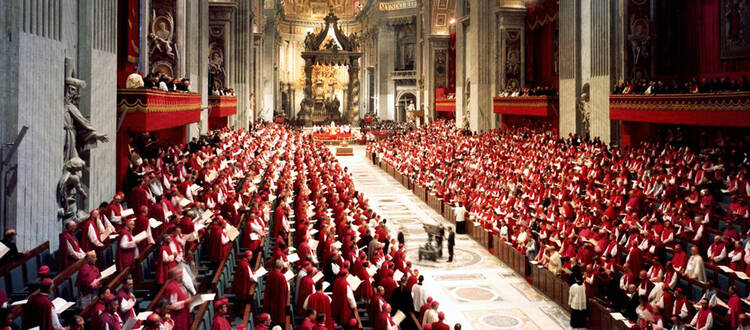Editor’s note: This article has been republished as part of America’s special 110th anniversary issue. It was originally published Oct. 6, 1962.
To question the Second Vatican Council’s chances for success on the eve of its opening may seem to be inappropriate, at the very least, if not misguided or even disloyal. Yet the subject deserves airing precisely because it continues to be raised—for a variety of reasons—in some circles. What grounds exist, then, for reasonable confidence in the Council’s outcome?
Looking at the preparations made for it, even in purely human terms, there is ample reason to be hopeful about its deliberations. Despite fears expressed at the beginning, the preparatory stage of the Council’s history proved to be unique for breadth and thoroughness. In reply to 2,812 individual requests sent from Rome for suggestions on conciliar agenda, 2,150 responses came from bishops and theologians all over the world. Their proposals ran to 9,424 pages of print in a set of 14 volumes.
The result can, and indeed must, prove to be a Council for our times, a renewal of the Church, a new Pentecost.
As for the Council itself, certain doubts may have arisen out of sheer misconceptions. To begin with, it will not be a meeting exclusively of the aged. More than 60 percent of the bishops to attend it are men born in the 20th century, and 640 of them are less than 50 years of age. They come from some ninety lands and from widely differing backgrounds as pastors, administrators, scholars, diplomats or missionaries. Moreover, as our American hierarchy observed in their joint statement on the Council, each group brings with it the riches of experience gained in a particular historical and cultural environment. Finally, each bishop comes prepared to speak in the name of all the faithful in his own diocese. This, in fact, prompted bishops in Austria, France, Germany, Poland, Holland and other countries to make formal inquiries about the views of both clergy and laity as they prepared for the monumental task before them.
That task, it must be remembered, will not be simply to ratify decisions already formulated or to vote for items on a closed agenda. Free discussion and frank exchange of views will characterize all meetings. Of its nature, the Council will differ vastly from other gatherings such as the recent Roman synod. Above all, this will be because Catholic belief teaches that this assembly enjoys in an extraordinary way the guidance of the Holy Spirit. In it, each bishop freely deliberates and judges as an equal among his fellow successors to the apostles. A weighing of these and other aspects of the coming Council led Fr. Giovanni Caprile, S. J., in a rigorously documented and informed article appearing in the September 15 issue of the influential Roman fortnightly Civiltà Cattolica, to conclude that the soundest attitude to adopt toward its probable outcome is one of “healthy realism.”
For a Catholic, the proper mood at this moment when the Church communes with itself in the 21st Ecumenical Council must be one of serene confidence and of generous concern to support the bishops with continuing prayer. The result can, and indeed must, prove to be a Council for our times, a renewal of the Church, a new Pentecost.









